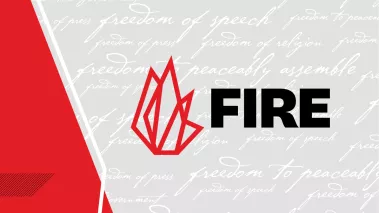Table of Contents
There Is No Such Thing as ‘Hate Speech’

Yes, that is correct. “Hate speech” is not a category of speech recognized under current constitutional law. It is merely a convenient way to pigeonhole speech that some people find offensive. But what is very troubling is when people begin to treat “hate speech” as unprotected speech. For example, a student leader at Penn State, a university which was recently sued for its unconstitutionally vague and overbroad speech codes, made the following comment featured in a prominent article in the student newspaper The Daily Collegian:
“We support any and all university policies that prohibit intolerant actions against any student on this campus," said Watson, adding that hate speech was not protected by the constitution. [Emphasis added.]
Unfortunately, this is not the first time that a statement like this has been made. This belief has become somewhat pervasive, especially on college campuses, making it high time to put this fundamentally false and dangerous belief to rest.
Hate speech and the First Amendment
Is hate speech protected by the First Amendment?
There is no constitutional exception for so-called hate speech. The First Amendment fully protects speech that some may find offensive, unpopular, or even racist. The First Amendment allows you to wear a jacket that says “Fuck the Draft” in a public building (see Cohen v. California, 403 U.S. 15), yell “We’ll take the fucking street later!” during a protest (see Hess v. Indiana, 414 U.S. 105), burn the American flag in protest (Texas v. Johnson, 491 U.S. 397 and United States v. Eichman, 496 U.S. 310), and even give a racially charged speech to a restless crowd (see Terminello v. Chicago, 337 U.S. 1). You can even, consistent with the First Amendment, call for the overthrow of the United States government (see Brandenburg v. Ohio, 395 U.S. 444). This is not a recent development in constitutional law—these cases date back to 1949.<
The U.S. Supreme Court stated the general rule regarding protected speech quite well in Texas v. Johnson, when it held:
The government may not prohibit the verbal or nonverbal expression of an idea merely because society finds the idea offensive or disagreeable.
Federal courts have consistently followed this holding when applying the First Amendment to public universities. While invalidating sanctions placed on a fraternity for holding an “ugly woman contest,” a federal district court in Iota Xi Chapter of Sigma Chi Fraternity v. George Mason University, 993 F.2d 386, held:
The First Amendment does not recognize exceptions for bigotry, racism, and religious intolerance or ideas or matters some may deem trivial, vulgar or profane.
Furthermore, federal courts have consistently used this concept in striking down college speech codes that regulate offensive or unpopular language (for examples, see Doe v. University of Michigan, 721 F. Supp. 852, UWM Post, Inc., v. Board of Regents of University of Wisc., 774 F. Supp. 1163, and Bair v. Shippensburg Univ., 280 F. Supp. 2d 357). The law is so consistent that not one college speech code challenged in federal court has ever been left standing.
As you can see, it is settled law that public universities, in order to be consistent with the First Amendment, cannot regulate or suppress speech based upon its content, even when it is offensive, vulgar, profane, or unpopular. A university, especially one run with our tax dollars, should be a marketplace of ideas where open and vigorous discourse is encouraged and not suppressed by crafty speech codes and the threat of disciplinary sanctions.
Make sure to check out FIRE’s Guide to Free Speech on Campus for an excellent resource on this subject.
Recent Articles
FIRE’s award-winning Newsdesk covers the free speech news you need to stay informed.

Is there a global free speech recession?
Podcast
We travel from America to Europe, Russia, China, and more places to answer the question: Is there a global free speech recession? Guests: - : FIRE senior scholar, global expression - : FIRE senior fellow - : FIRE senior fellow Timestamps: ...

‘Executive Watch’: The breadth and depth of the Trump administration’s threat to the First Amendment — First Amendment News 465

University of Wisconsin academic freedom panel back on after effort to disinvite speaker
